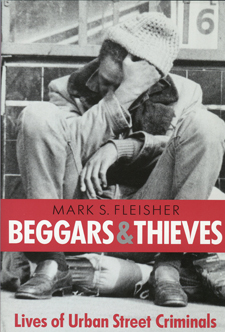The University of Wisconsin Press
Criminology / Sociology / Anthropology / Public Policy
|
Beggars and Thieves Winner of the 1995 CHOICE Outstanding Academic Books Award "The most important study of street criminals published in twenty years. After reading this book, I find that neither liberal nor conservative proposals for meeting the growing inner city youth crime problem are persuasive. Likewise, neither conventional family-preservation policies nor more social programs can be taken as serious responses to the crisis. For policy makers, scholars, activists, and average citizens who want to defuse urban America's ticking crime bomb, this book is truly must reading."—John J. DiIulio, Jr., author of No Escape: The Future of American Corrections As the incidence of violent crime rises in the United States, so does the public demand for a solution. But what will work? Mark S. Fleisher has spent years among inmates in jails and prisons and on the streets with thieves, gang members, addicts, and life-long criminals in Seattle and other cities across the country. In Beggars and Thieves, he writes about how and why they become and remain offenders, and about the actual role of jails and prisons in efforts to deter crime and rehabilitate criminals. Fleisher shows, with wrenching firsthand accounts, that parents who are addicts, abusers, and criminals beget irreversibly damaged children who become addicts, abusers, and criminals. Further, Fleisher contends that many well-intentioned educational and vocational training programs are wasted because they are offered too late to help. And, he provides sobering evidence that many youthful and adult offenders find themselves better off in prison—with work to do, medical care, a clean place to sleep, regular meals, and stable social ties—than they are in America's cities. |

August 1995
|
|||||||||||
|
|
If you have trouble accessing any page in this web site,
contact our Web manager. Updated April 23, 2010 © 2010, The Board of Regents of the University of Wisconsin System |